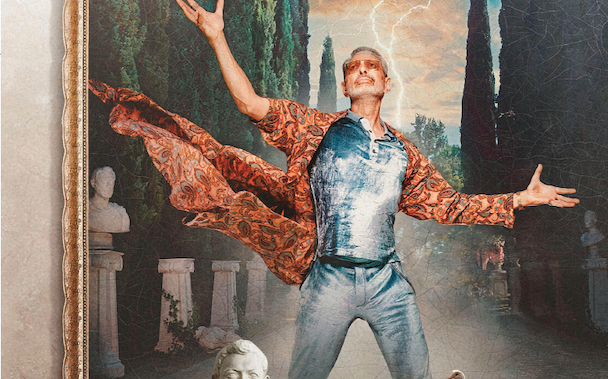Marketers can draw timeless lessons from classical Greek and Roman culture
As a microcosm of the broader world, the domains of marketing and communications tend to be in thrall to the latest and shiniest fad: TikTok, Instagram, YouTube influencers, the diet du jour (intermittent ketogenic regime, anyone?).
As a complement – or perhaps an antidote – to this insatiable short-termism, we may need to look toward something that is rather more universal, strategic and timeless. As someone who has been a long-term evangelist for restoring the lost art of storytelling to our business and comms world, the classics can offer us insights and lessons.
Now, you may protest that it’s all dead languages, dated leaders and dark myths. I’d argue you’re wrong. At the time of writing, I can point to the Netflix series Kaos, with Jeff Goldblum perfectly cast as Zeus in a contemporary reimagining of Greek mythology. Netflix also features the French gangster series Furies, German sci-fi thriller Cassandra, and Colombian thriller, Medusa. Then there is Those About to Die, a Roman epic of sports rivalries, with Anthony Hopkins as Emperor Vespasian – while Ridley Scott’s second Gladiator film launched to great fanfare in 2024.
The popularity of the classics doesn’t stop with TV and film. In the book world, look at the success of Stephen Fry’s Greek myths series, Madeline Miller’s Song of Achilles and Circe, Jennifer Saint’s Ariadne and Hera, or Pat Barker’s trilogy of Greek war stories. In theatre, a musical re-imagining of Orpheus and Eurydice, Hadestown, is playing on Broadway and in London.
Clearly, the classics remain a rich source of stories that capture the popular imagination. They have much to offer marketers, too. Here are three ways in which a grounding in – or re-familiarization with – the classics can create insight and innovation in the marketing and communications environment.
Myth and story
Myths are stories we tell ourselves to explain the world. They are a timeless body of fundamental wisdom, the encapsulation of philosophy in story form, the embodiment of enduring human urges, instincts and fears.
Ancient myths provide a core of human wisdom that can not only help us live better lives but also provide an infinite bounty of ideas, metaphors and analogies for any form of communication, professional or private. They can also educate us in the moral and philosophical realms.
Many successful brands have explored the power of myth by finding – or building – their own brand mythology. Richard Branson’s Virgin is one. Nike, named after the Greek goddess of victory, is another – with its own origin story, based on the use of a waffle iron to create the sole of its first sneakers. Sports teams can excel in creating a myth, too – like Manchester United.
So, find your brand mythology, and use story and myth in your presentation: the hero, the epiphany, and the inciting incident.
Vocabulary
For English speakers, a fresh look at the influence of Latin and Greek on our language can unveil fresh truths and avoid the meaningless depths of jargon. A few examples of words and ideas rooted in the classical languages makes the point.
Authority
An etymological reminder that we are designed to give authors (storytellers) credibility
Information
We shouldn’t batter our audience senseless with data, but rather give shape (‘form’) to our content
Saliency
Originating in the Latin salire, meaning to leap, this is an idea that’s key to effective brands and communications: they must ‘jump out’ in order to be effective
Decide
Meaning to ‘cut down’ – as seen in other ‘-cide’ words, as well as ‘incisive’ and ‘scissors’ – the origins of ‘decide’ remind us that we need to cut out branches from the tree of choice
Persuasion and rhetoric
Anyone remotely interested in improving their presentation and argumentation skills (and that’s pretty much everyone) should learn from the greats – and not just modern orators like Martin Luther King, Mandela or the Obamas.
As well as being a major statesman, the West’s first and most illustrious lawyer, and a central figure in the politics of the late Roman Republic, Marcus Tullius Cicero (106-43 BCE) was a scholar, thinker, writer and teacher. Rhetoric was an obsession for Cicero; his writings on the subject spanned his whole life. As a novus homo (a new man – we would probably say member of the middle class), he lacked the aristocratic connections that would have enabled him to move up the political ladder, so instead he became a master of legal speeches and public argument.
More than 2,000 years later, we can do worse than summarize Cicero’s goals for persuasive speaking, as captured in his three-word mantra. He describes the aim of the orator as “docere, delectare et movere” – which translates as “to prove, to delight and to move.”
Timeless inspiration
If we want to create genuinely insightful and original services, brands and communication ideas, we should try to be more porous in our sources and influences. Storytelling and persuasion are essential not just to finding new ideas, but to persuading colleagues, clients and stakeholders of their merits.
Bathing in the legends and learnings of the Greeks and Romans is not a Herculean task, but it will take you on an Odyssey; one that might prevent you opening a Pandora’s box, and instead help you find a plethora of eureka moments.



